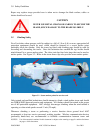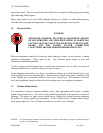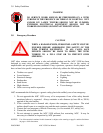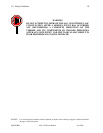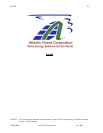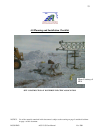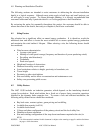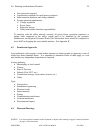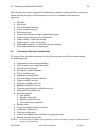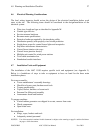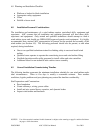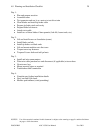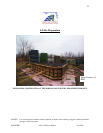4.0 Planning and Installation Checklist
NOTICE: Use of the material contained in this document is subject to the warning on page Iv and the disclaimer
on page v of this document.
DOC012R02 AOC 15/50 User Manual Nov 2001
24
The following sections are intended to assist customers in addressing the relevant installation
details in a logical sequence. Although most points apply to both large and small projects, not
all will apply to every project. To ensure thorough planning, it is strongly recommended that
customers understand why a particular detail is or is not appropriate to their installation.
By reviewing the entire list repeatedly throughout the project, the customer should be able to
ensure that none of the details, necessary to complete it, have been overlooked.
4.1 Siting Factors
Site selection has a significant effect on annual energy production. It is, therefore, worth the
additional time and effort to locate the most suitable site to ensure optimal energy production
and maximize the wind turbine’s lifespan. When selecting a site, the following factors should
be considered:
• Wind resource characteristics
§ Average wind speed
§ Makeup of wind speed average (frequency and duration of power producing winds)
§ Prevailing wind direction(s)
§ Turbulence
§ Peak wind speeds
• Height and location of obstructions
• Distance from utility service point
• Local restrictions relative to height, proximity to boundaries, etc.
• Tower height
• Proximity to other wind turbines
• Site accessibility and its effect on construction and maintenance costs
• Safety zone preventing public access
4.2 Utility Factors
The AOC 15/50 includes an induction generator, which depends on the interfacing electrical
system for excitation. Each wind turbine has a fixed set of power factor correction capacitors
installed in the dynamic brake capacitor box. To ensure a safe and efficient installation, the
following utility related factors should be considered:
• Buy back rates, contract options, green pricing and net billing
• Available line capacity (in kVA)
• Available fault current
• Voltage and phase configuration of the primary circuit and the local utility line
• Distance to nearest substation
• Size and winding configuration of the step down transformer required at the site (in
kVA)



